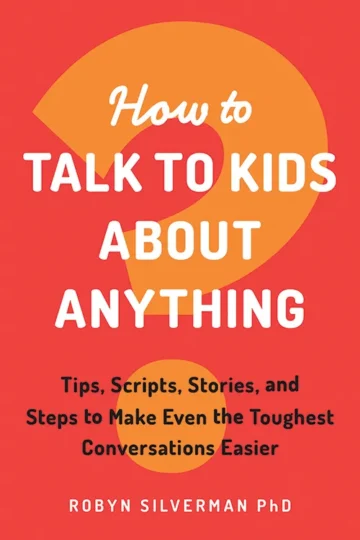Robyn Silverman stands alone on an elementary school blacktop, sadly kicking rocks. On the other side of the playground, some of her classmates point and laugh, making no effort to hide the object of their gossip and derision. To make things even worse, none of the well-meaning adults in Silverman’s life seem to have any idea what to say or how to help.
“My mom would just hand me tissue after tissue,” Silverman says, recalling the bullying she endured in the fifth grade. “I never let go of that completely. It set me on a path where I wanted to help parents and key adults have important conversations with kids so that they don’t feel so alone.”

How to Talk to Kids about Anything
Tips, Scripts, Stories, and Steps to Make Even the Toughest Conversations Easier
Now a child- and teen-development specialist known as “Dr. Robyn,” Silverman, AB ’96, speaks around the country and in the media about parenting and character education. Her national- bestselling book How to Talk to Kids About Anything (Sourcebooks, October 2023) provides the kinds of simple, research-backed tips and scripts she wishes her parents and teachers had had on hand when she was in grade school. In addition to covering friendship and bullying, it provides steps for discussing squirm-inducing topics like death, divorce, body image and, of course, the most dreaded topic of all.
“Nobody wants to talk about sex. They also don’t want to talk about death, but sex is probably No. 1 and death is a close second,” Silverman says with a laugh.
In the chapter on sex, Silverman breaks down the birds-and-bees talk into a series of approachable moments. Everyday scenarios like passing menstrual hygiene products in the grocery store can be conversation-starters, which over time can make puberty and sex a less taboo topic for both kids and parents. And then when direct questions do arise (like the infamous “How does the baby get in there?”), Silverman has scripted responses at the ready.
The book’s scripts are grounded in information and statistics from dozens of studies, bolstered by a series of in-depth interviews between Silverman and fellow child development experts. Many of these conversations can be accessed in their entirety as episodes of Silverman’s popular podcast, also titled How to Talk to Kids About Anything.
“I started the podcast in 2017 understanding that at the same time I was doing interviews for my book,” Silverman says. “I thought, ‘Why would I keep this to myself?’ It’s such an amazing resource.”
Silverman says her writing and podcasting career benefited from her time spent at Washington University, where she honed her skills in synthesizing and translating information. She double-majored in psychology and English literature at WashU before earning a doctorate in child development at Tufts University.
“WashU is where I really learned how to write,” she says. “For my psychology thesis and many English papers, I loved finding the connections between texts and putting information through a funnel to find out what’s important and what’s interesting. That’s my wheelhouse. For this book, that meant translating interviews and studies into words that we would actually say to our children.”
So, after six years of research and her book’s success, what would Silverman want an adult to say to her former fifth-grade self? “I would have wanted someone to let me know that it wasn’t my fault, and that that’s not how real friends behave, and that it’s OK to feel sad and angry and betrayed,” she says. “I would want somebody to say to me, ‘You are enough as you are.’”
These types of conversations don’t have to happen only when things go wrong. Silverman hopes her book will encourage parents to bring forthrightness, compassion and accurate information into their day-to-day talks with their children — turning all kinds of “big conversations” into a series of little ones.
“Each time that we step up to have a conversation with our kid, we show that we’re the trusted source,” Silverman says. “When you’re building a conversation, you’re building on a connection.”


